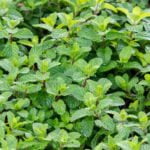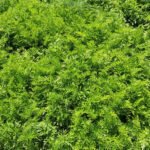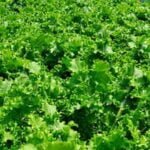Pine mulch is a popular choice for many gardeners, but the question remains: is pine mulch safe for vegetable gardens? Mulching is an essential practice in vegetable gardening that can provide numerous benefits, such as moisture retention, weed suppression, and soil temperature regulation. However, the type of mulch used can have a significant impact on plant health and overall garden success.
When it comes to choosing mulch for your vegetable garden, understanding the characteristics of different types of mulch is crucial. Pine mulch, made from pine needles or bark, is known for its ability to break down slowly, adding valuable nutrients to the soil over time. Despite its benefits, some gardeners may have concerns about using pine mulch in their vegetable gardens due to potential risks and considerations to bear in mind.
In this article, we will explore the pros and cons of using pine mulch in vegetable gardens, as well as provide tips for safely incorporating this type of mulch into your gardening practices. Additionally, we will discuss alternative options to pine mulch that may better suit your specific gardening needs. By weighing these factors carefully, you can determine whether pine mulch is safe for your vegetable garden and ensure a thriving harvest season ahead.
Benefits of Using Mulch in Vegetable Gardens
Using mulch in vegetable gardens provides a multitude of benefits that can significantly improve the health and yield of your plants. Here are some of the key advantages of incorporating mulch into your gardening routine:
- Weed suppression: Mulch helps to suppress weed growth by blocking out sunlight and preventing weed seeds from germinating, reducing the need for manual weeding.
- Moisture retention: Mulch acts as a protective barrier, reducing evaporation from the soil and helping to retain moisture levels, which is crucial for healthy plant growth.
- Temperature regulation: Mulch helps to insulate the soil, keeping it cooler in hot weather and warmer in cold weather, creating a more stable environment for plant roots.
In addition to these benefits, mulch also improves soil structure and fertility over time by gradually breaking down and adding organic matter to the soil. This organic matter provides essential nutrients for plants, promotes beneficial microbial activity, and enhances overall soil health.
Overall, using mulch in vegetable gardens is a simple and cost-effective way to improve growing conditions, maximize crop yields, reduce maintenance tasks such as weeding, and promote overall plant health. When considering different types of mulch options for your garden, it’s important to choose one that aligns with your specific gardening needs and preferences.
Types of Mulch Available for Vegetable Gardens
When it comes to choosing the right type of mulch for your vegetable garden, there are several options available, each with its unique characteristics and benefits. One common type of mulch that many gardeners consider is pine mulch. Pine mulch is popular for its natural appearance, affordability, and ability to suppress weeds effectively. However, one question that often arises is: Is pine mulch safe for vegetable gardens?
Pine mulch is generally considered safe for vegetable gardens as long as it is used correctly and in moderation. One of the main concerns with using pine mulch in vegetable gardens is its acidity level. Pine needles tend to be slightly acidic, which can affect the pH of the soil over time.
However, this can be beneficial for acid-loving plants such as tomatoes, peppers, and potatoes. To mitigate any potential issues with soil pH, it is essential to monitor the acidity levels regularly and adjust as needed by adding lime or other amendments.
Another consideration when using pine mulch in vegetable gardens is the potential risk of allelopathy. Allelopathy refers to the ability of certain plants to release chemicals that inhibit the growth of other plants in their vicinity. Some types of pine trees contain compounds that may have allelopathic effects on certain vegetables.
To reduce the risk of allelopathy, it is recommended to age or compost the pine mulch before using it in your garden. This process helps break down any potentially harmful compounds and allows beneficial microbes to thrive.
To ensure that pine mulch enhances rather than hinders your vegetable garden, here are some tips for safely using it:
- Use aged or composted pine mulch to reduce acidity levels and minimize allelopathic effects.
- Monitor soil pH regularly and make adjustments as needed.
- Apply a thin layer of pine mulch around plants to prevent weed growth without smothering them.
By following these guidelines, you can enjoy the benefits of using pine mulch in your vegetable garden while minimizing any potential risks associated with its use.
| Aspect | Recommendation |
|---|---|
| Use Aged Mulch | To reduce acidity levels and minimize allelopathic effects |
| Monitor pH Levels | Regularly check soil pH and make necessary adjustments |
| Apply Thin Layer | Avoid smothering plants by applying a thin layer of pine mulch |
Characteristics of Pine Mulch
Pine mulch is a popular choice for vegetable gardeners due to its many beneficial characteristics. It not only helps suppress weeds and retain moisture in the soil, but it also adds organic matter as it breaks down, enriching the soil with nutrients over time. Additionally, pine mulch has a pleasant scent that can add to the overall ambiance of your garden.
When it comes to using pine mulch in vegetable gardens, there are a few key characteristics to keep in mind:
- Acidic pH Level: Pine mulch typically has a slightly acidic pH level, which can be beneficial for acid-loving plants such as tomatoes, peppers, and potatoes.
- Longevity: Pine mulch tends to break down slowly compared to other types of mulch, making it a long-lasting option for your vegetable garden.
- Aesthetic Appeal: The light color of pine mulch can provide a visually appealing contrast with the vibrant greens of your vegetable plants.
Despite these positive attributes, some gardeners may have concerns about using pine mulch in their vegetable gardens. One common worry is that pine mulch may lead to an increase in soil acidity over time. However, with proper management and monitoring of soil pH levels, this risk can be minimized.
Ultimately, whether or not pine mulch is safe for your vegetable garden depends on various factors such as the specific needs of your plants, the existing soil conditions, and your own gardening practices. By considering these factors and implementing our tips for safely using pine mulch in vegetable gardens, you can make an informed decision on whether this type of mulch is right for you.
Potential Risks and Concerns of Using Pine Mulch in Vegetable Gardens
Pine mulch is a popular choice for gardeners due to its affordability, availability, and attractive aesthetics. However, there are some potential risks and concerns associated with using pine mulch in vegetable gardens that should be taken into consideration.
Acidic pH Levels
One of the main concerns with using pine mulch in vegetable gardens is its acidic nature. Pine mulch has a tendency to lower the pH level of the soil over time, making it less suitable for certain plants that prefer neutral or alkaline soil conditions. This can lead to nutrient deficiencies in vegetables, affecting their growth and overall health.
Allelopathic Effects
Another potential risk of using pine mulch is its allelopathic effects. Some pine species release substances that inhibit the growth of other plants around them, which can negatively impact the growth of vegetables in close proximity. This can result in stunted growth, reduced yield, or even plant death in extreme cases.
Mold and Fungus Growth
Additionally, pine mulch is prone to mold and fungus growth, especially in moist environments. This can create an environment conducive to plant diseases, affecting the health of your vegetable garden. Proper ventilation and drainage are essential when using pine mulch to mitigate this risk. Consider rotating your crops regularly and monitoring for any signs of mold or fungus growth when using pine mulch in your vegetable garden.
Overall, while pine mulch can be a cost-effective and visually appealing option for vegetable gardens, it is important to be aware of these potential risks and concerns before incorporating it into your garden. Conducting a soil test before applying pine mulch can help determine if it is suitable for your specific vegetable plants. Consider alternative mulching options if you have concerns about the compatibility of pine mulch with your garden’s needs.
Tips for Safely Using Pine Mulch in Vegetable Gardens
Pine mulch is a popular choice among gardeners for its affordability and natural appearance. However, many gardeners often wonder, “Is pine mulch safe for vegetable gardens?” The answer is yes, but there are specific precautions and tips that should be considered when using pine mulch in vegetable gardens to ensure the health of your plants and soil.
Use Aged Pine Mulch
One important tip for safely using pine mulch in vegetable gardens is to use aged pine mulch. Fresh pine mulch has high levels of tannins, which can be harmful to young plants and seedlings. By using aged pine mulch, the tannins have had time to break down, making it safer for your vegetable garden.
Monitor Soil pH Levels
Another tip is to regularly monitor the pH levels of your soil when using pine mulch. Pine mulch has a slightly acidic nature, which can affect the pH of your soil over time. If you notice a decrease in pH levels, consider adding lime to balance out the acidity and prevent any negative impact on your vegetable plants.
Avoid Direct Contact With Plant Stems
When applying pine mulch in your vegetable garden, make sure to avoid direct contact with the stems of your plants. Pine mulch can retain moisture, which may lead to rot or fungal issues if placed too closely against plant stems. Create a small gap between the base of your plants and the pine mulch to prevent any potential damage.
By following these tips for safely using pine mulch in vegetable gardens, you can enjoy the many benefits this type of mulch offers while ensuring the health and success of your vegetable plants. Remember that proper application and maintenance are key factors in determining the safety and effectiveness of any type of mulch in your garden.
Alternatives to Pine Mulch for Vegetable Gardens
When considering alternatives to pine mulch for vegetable gardens, there are several options that can provide similar benefits without the potential risks associated with pine mulch. One popular alternative is straw mulch, which is a natural and biodegradable option that can help retain moisture, suppress weeds, and regulate soil temperature in vegetable gardens. Straw mulch is readily available at garden centers and can be easily applied around plants.
Another alternative to pine mulch is grass clippings, which can be a cost-effective option for mulching vegetable gardens. Grass clippings are rich in nitrogen and break down quickly to release nutrients into the soil. However, it is important to use grass clippings from untreated lawns to avoid introducing chemicals or pesticides into the vegetable garden.
Additionally, compost can serve as an excellent alternative to pine mulch in vegetable gardens. Compost is a nutrient-rich soil amendment that helps improve soil structure and fertility. Applying compost as mulch in vegetable gardens can enhance plant growth and yield while reducing the need for synthetic fertilizers.
| Alternative | Benefits |
|---|---|
| Straw Mulch | Retains moisture, suppresses weeds, regulates soil temperature |
| Grass Clippings | Rich in nitrogen, breaks down quickly to release nutrients into the soil |
| Compost | Nutrient-rich, improves soil structure and fertility |
Conclusion
In conclusion, the question of whether pine mulch is safe for vegetable gardens ultimately depends on several factors that gardeners should take into consideration. While pine mulch offers benefits such as weed suppression, moisture retention, and soil insulation, there are some potential risks and concerns to be aware of.
One major concern with using pine mulch in vegetable gardens is its acidity levels, which can potentially affect the pH of the soil. It is important to monitor soil pH regularly and adjust as needed to ensure optimal conditions for vegetable growth. Additionally, some plants may be sensitive to pine mulch due to its natural compounds, so it is crucial to observe how your vegetables respond to the mulch.
To safely use pine mulch in your vegetable garden, consider taking steps such as mixing it with other types of mulch or compost to balance out its effects on soil pH. Monitoring plant health and addressing any signs of distress promptly can help prevent any negative impacts from the use of pine mulch in your garden. Ultimately, the decision to use pine mulch should be based on your individual gardening practices and needs.
If you have concerns about using pine mulch in your vegetable garden, there are alternative options available such as straw, grass clippings, or compost that can provide similar benefits without potential risks associated with pine mulch. It is essential to weigh the pros and cons of each type of mulch before making a decision that is best suited for your specific vegetable garden needs.
Frequently Asked Questions
Can You Put Pine Mulch in a Vegetable Garden?
Pine mulch can be used in a vegetable garden, but there are some things to consider. Pine mulch is acidic, so it may not be suitable for all plants in the vegetable garden. It also takes longer to decompose compared to other mulches, so it may need to be replenished less frequently.
What’s the Best Mulch to Use in a Vegetable Garden?
The best mulch to use in a vegetable garden depends on various factors such as the type of vegetables being grown, the climate, and personal preference. Organic mulches like straw, grass clippings, and compost are popular choices as they help improve soil health and retain moisture. Inorganic options like plastic or landscape fabric can also be effective at controlling weeds.
Can I Use Pine Mulch for Tomatoes?
Pine mulch can be used for tomatoes, but with caution. Because pine mulch is acidic, it may not be ideal for tomatoes which prefer slightly acidic to neutral soil pH levels. If using pine mulch around tomato plants, monitor the pH levels of the soil regularly to ensure it remains within the appropriate range for optimal tomato growth.

If you’re looking to get into vegetable gardening, or are just looking for some tips on how to make your current garden better, then you’ve come to the right place! My name is Ethel and I have been gardening for years. In this blog, I’m going to share with you some of my best tips on how to create a successful vegetable garden.





